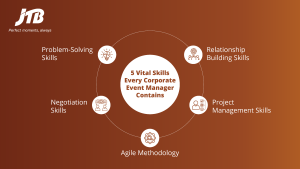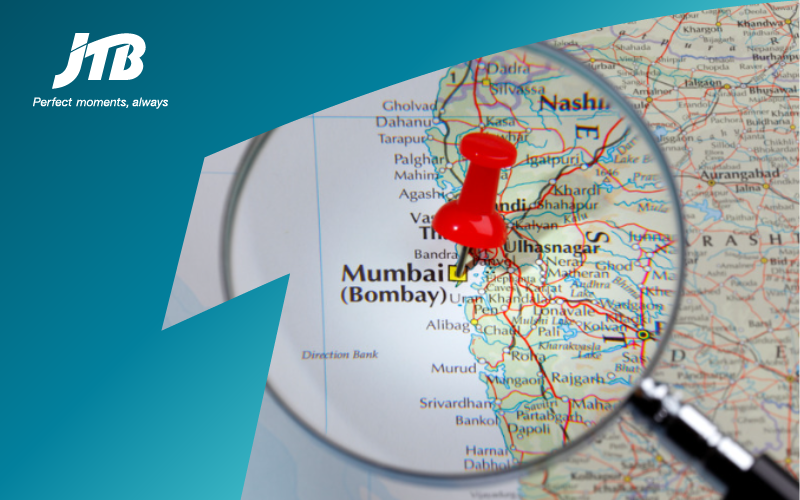The pursuit of becoming a corporate event manager needs a comprehensive approach that integrates creativity, collaboration, and the ability to build connections. It entails coordinating every facet of events, from idea to implementation, and ensuring that every element aligns with the client’s objectives and vision.
Prepare to be immersed in a fast-paced environment where you must balance many tasks, collaborate with diverse teams, and adapt to the evolving nature of events if you are serious about pursuing a career in event management.
Engaging in this profession presents a combination of intellectual stimulation and challenge, yet it furnishes chances for bringing happiness and lasting moments to individuals via organising events with extreme precision.
So, to stand out in this field, aspiring event managers should focus on developing a broad skill set, gaining experience, and continuously learning from organisations like JTB India.
What Is a Corporate Event Manager?
A dynamic professional, an event manager specialises in the organisation, coordination, and implementation of events. It extends the spectrum from major corporate conferences to expansive events.
They execute the event’s objectives and fulfil the attendees’ and clients’ expectations with precision. Also, they arrange each detail in the background to ensure a smooth progression.
A variety of skills are required to carry out complex and unpredictable projects. Event managers are proficient at interpreting ideas into unforgettable experiences due to their attention to detail.
Their position is critical to the success of any corporate event. It demands an exceptional combination of organisational insight, interpersonal competence, and problem-solving capabilities.
In addition to managing logistics, they establish an atmosphere that has a profound impact on their capacity as planners of live experience.
5 Vital Skills Every Corporate Event Manager Contains
Organising meetings and events is a fast-paced industry. Mastering many skills enables corporate event managers to remain informed of event trends, developments, and achievable aims.
Here are the top five skills that every event manager possesses:
1. Relationship Building Skills
Possessing this skill is crucial for succeeding as a corporate event manager. It is essential to know how to collaborate and interact with a variety of individuals.
It includes C-level executives, vendors, sponsors, customers, coworkers from other departments, and event attendees. So, a corporate event management position requires interaction with different vendors and stakeholders.
Event managers must also negotiate and resolve disputes to establish and maintain positive relationships. If you gain such management skills, people will want to work with you often and help you excel at your work.
2. Project Management Skills
Executing an event necessitates managing many duties. During the phases of planning and execution, an effective multitasker must have commanding abilities, including budget management.
The majority of corporate event managers plan and organise events with the assistance of event management software, allowing them to track expenses and stay within budget constraints.
They complete the events with step-by-step protocols and well-documented processes, ensuring financial resources are allocated efficiently. They are also able to maintain concentration on the big picture while avoiding the oversight of minor details.
If events deviate from their initial plans, they promptly transition to “Plan B” by using their proficient organisational skills and adjusting the budget accordingly. Using professional MICE services, such as those offered by JTB India, can greatly assist in maintaining these high organisational and budgetary standards.
JTB India’s meticulous planning and attention to detail ensure every aspect of an event is curated to perfection, helping event managers execute flawless and memorable experiences.
3. Agile Methodology
A corporate event manager must be flexible and quick on their toes due to the unpredictable and fast-paced nature of event management. For large events that involve collaboration with various stakeholders, it is effective to break down the planning process into smaller, more manageable tasks.
This approach ensures that each component of the event receives the necessary attention and resources.
Furthermore, agile iterative activities allow for quick adaptation to unexpected risks or changes, enabling adjustments to the overall project trajectory as needed. This flexibility enables event managers to make real-time adjustments, ensuring that the event stays on track despite unforeseen challenges.
For instance, an event manager might rapidly switch from assisting with A/V setup to managing personnel, highlighting the importance of adaptability in event management.
By incorporating agile methodology, corporate event managers can enhance their efficiency and responsiveness, ultimately leading to the successful execution of complex events.
4. Negotiation Skills
Corporate events often necessitate the involvement of an agent due to the high-level negotiation skills required. Event managers must possess the qualities of an open and confident communicator to guarantee that all individuals comprehend the current aim and the overarching goals of the event.
Event planners maintain composure and engage in considerate and well-mannered communication with individuals, including those who are not affiliated with their organisation or team, even when faced with challenging circumstances.
This level of diplomacy and negotiation is crucial in dealing with various stakeholders, vendors, and clients to ensure all parties are aligned and conflicts are resolved efficiently.
Moreover, successful event managers accept criticism and value the ideas of others. They understand that each individual contributes to the realisation of a successful event, so communication must be constructive and confident.
This collaborative approach is vital in negotiating contracts, securing venues, and managing supplier relationships, which are all integral parts of event planning that require a professional touch.
By leveraging the expertise of an event management agent, corporations can ensure that their events are executed with precision, benefiting from the agent’s advanced negotiation skills and experience in handling complex logistical and interpersonal dynamics.
5. Problem-Solving Skills
Because event coordination is capricious, event managers must be adept at problem-solving and quick-witted. Implementing innovative determinations can mitigate unexpected complications and last-minute errors.
A set of competencies necessary for success as an event manager includes the following:
- Self-assurance in decision-making and effective interpersonal abilities
- An appreciation for a dynamic work setting
- The ability to maintain concentration amidst disorder
- A propensity for working overtime and on weekends to achieve the goal
- Creative thinking and dedication in listening
With these 5 skills, you can become an exceptional corporate event planner. But what are the strategies that can boost your effectiveness? Let’s find it out here.
5 Strategies to Become a Successful Corporate Event Manager
A diverse set of abilities, including thoughts, planning, and people skills, are necessary for success as a corporate event manager. From planning to execution, it’s all about coordinating with the client to make sure their vision and objectives are met.
Becoming a successful corporate event manager requires a blend of skills, strategic planning, and industry knowledge. To excel, focus on developing strong organizational skills through detailed planning, effective time management, and meticulous attention to detail.
1. Gain Relevant Education and Understand the Latest Trends
Attending industry conferences such as the GBTA APAC conference, where esteemed organisations like JTB India actively participate, provides an invaluable opportunity to gain relevant education and understand the latest trends in event management.
These conferences serve as the best platforms for professionals to stay updated on emerging industry practices, technological advancements, and market trends. Engaging with industry experts and participating in educational sessions offered at such events can significantly enhance one’s understanding of the evolving landscape of event management.
Constantly emerging new technologies and trends contribute to the dynamic nature of the event management industry. Engage in continuing education courses, attend webinars, and follow industry news to remain informed. Adopt sustainable practices and cutting-edge event technologies to maintain a competitive edge. Also, provide clients with inventive things.
2. Gain Practical Experience in Event Planning and Building the framework
For business professionals aspiring to excel in event management, acquiring practical experience in event planning and building the framework is paramount.
Seek internships or entry-level positions at reputable hotels, conference centers, or event planning firms to immerse yourself in the intricacies of event execution within a corporate environment adhering to their objectives. and compliance.
Additionally, consider organising events on behalf of local business associations, chambers of commerce, or industry conferences to expand your network and gain exposure to diverse event formats and requirements.
By actively engaging in hands-on experiences, you’ll develop the necessary skills and expertise to confidently navigate the complexities of corporate event planning and management.
3. Build Your Professional Network
Networking is a critical component of the event management profession. Take part in seminars, workshops, and industry conferences, and become a member of professional organisations.
Establish relationships with seasoned event managers, suppliers, and vendors. The establishment of a strong professional network can result in employment prospects, collaborations, and mentorship.
Connecting with industry leaders and service providers like JTB India can be particularly beneficial. JTB India’s expertise in events and meetings can offer valuable insights, resources, and opportunities for collaboration.
Their extensive network and commitment to excellence make them an ideal partner for aspiring event managers looking to elevate their careers.
4. Leverage Technology to Maximise Value
In today’s digital age, harnessing technology is essential for maximising value in event management. Platforms like JTB Connect streamline event planning and execution.
From online registration to budget tracking and post-event analytics, it enhances efficiency and attendee satisfaction.
By mastering such technologies, event managers optimise workflows and focus on strategic decision-making. Whether automating communication or integrating virtual components for hybrid events, staying abreast of advancements is crucial for competitiveness.
Leveraging platforms like JTB Connect facilitates smoother operations, expands networking, and enhances collaboration with partners. Embracing technology unlocks new possibilities and elevates event quality and success.
5. Develop Essential Event Management Skills
Building essential event management skills encompasses a multifaceted approach that includes gaining relevant education, practical experience, networking, and leveraging technology.
To succeed as an event manager, one must develop crucial skills and stay informed about industry trends, gain practical experience via internships and event organisation, network with professionals, and use technology platforms like JTB Connect for efficient meeting planning.
By prioritising education, hands-on experience, networking, and technology, aspiring event managers can lay the groundwork for success in the field. These skills enable them to adapt to the dynamic nature of event management, ensuring they’re well-equipped to handle the challenges and demands of organising successful events that meet clients’ expectations.
Through continuous learning and strategic networking, event managers can enhance their capabilities and thrive in this fast-paced and rewarding profession.
Train your mind to come up with original ideas for event experiences and hone your negotiating abilities to better collaborate with event sponsors and other stakeholders. The opportunities for growth and learning in this field are endless.
Also, each new event is a chance to learn something new and improve your skills. Establish a portfolio of your event management initiatives as you accumulate professional experience. Include photographs, testimonials, and descriptions of your specific role at each event.
Emphasize the obstacles you surmounted and the results you attained. Prospective clients or employers will be presented with a portfolio that showcases one’s competencies and significant accomplishments.
A prosperous career as a corporate event manager is constructed upon the foundation of each step. Creating unforgettable events can be a rewarding career path for those who possess the zeal, perseverance, and dedication to excellence that this journey demands.
5 Steps for Successful Event Management
A typical in-person event has five stages, each of which can be subdivided into many duties. Finalising the venue and food and beverage arrangements is unnecessary when organising an online event, such as a webinar. The distinct phases involved in organising online or hybrid events merit an entire article of their own.
As a corporate event manager, you will likely be involved in various phases of many events at any given time.
1. Conduct Research and Establish Objectives
Whether for your organisation or clients, the initial step in event planning is to learn the purpose and viability of the event. Fundraising, lead generation, product launch, or company anniversary commemoration are all potential outcomes of the event.
It is time to focus on event budgeting and goal setting once the format has been determined. All subsequent duties and stages of event planning with the established goal and budget.
2. Decide Event Theme and Design
At this stage, an event strategy is developed with the objectives. It consists of finalising the following to devising the theme:
- How do you plan to captivate the attendees?
- What will the event’s schedule and progression entail?
- Who will deliver the keynote address, and what is the anticipated number of presenters or performances?
- Where and when will it take place?
- What is the duration of the event?
- How will the stage, podium, tables, chairs, and breakout areas be organised?
- Will you be providing giveaways and produce distribution?
3. Event Specifics
It is time to put the corporate event manager’s vision into action once the event has been finalised. This phase comprises many crucial event management tasks, including:
- Distributing RFPs to venues and vendors
- Having venues, lecturers, and performers finalised (along with a backup plan).
- Communicating with performers and lecturers about the schedule.
- Attendee registration on an event website and development of a bespoke event application.
- Develop surveys before and after an event.
- Placing invitations and reminders for guests.
- Maintaining a record of event registrations.
- Volunteers and the team are instructed.
- Developing signage and designing the check-in procedure or testing on-site check-in technology.
- Constructing branded products intended for distribution.
4. Event Execution
Event managers should be present on this day. It represents the ideal integration of the laborious efforts and strategic preparations that have preceded it. Depending on the extent of the event, execution may begin or start a few days before or on the morning of the event.
5. Post-Event Communication and Reporting
Event management continues even after the event concludes. It also requires corporate event managers to comprehend the sentiments of sponsors, speakers, attendees, volunteers, and others.
Beginning participant feedback collection during the event itself is possible through methods such as observing visitor reactions, conducting on-site conversations with attendees, and distributing surveys. Additionally, sending a post-event survey 24-48 hours after the event concludes is a good method to gauge attendance.
Conclusion
Becoming an outstanding corporate event manager requires an ongoing commitment to development and education. Excellence, adaptability to the dynamic corporate environment, and a strong desire to curate memorable experiences are essential qualities.
By developing your skills, building solid connections, and maintaining a constructive outlook, you can succeed and distinguish yourself in this dynamic and satisfying industry.
Partnering with experts can make a significant difference for those looking to elevate their event management skills to the next level. JTB India’s MICE services, for instance, offer meticulously planned and captivating corporate events, leveraging their vast expertise and network.
Their attention to detail and commitment to excellence ensures unparalleled engagement and satisfaction, making them a valuable ally in your event management journey.






















